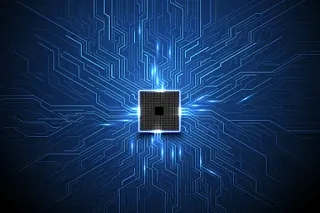Google , in partnership with the non-profit organization "XPRIZE", announced a 3-year global competition with a reward of 5 million US dollars, to search for the best applications and practical solutions related to the world of quantum computing .
The competition, which was launched earlier this week on March 4, aims to find and create practical applications and algorithms in quantum computing that directly contribute to the development of society, whether with immediate or long-term results, in accordance with the standards and goals of the United Nations for sustainable development.
The technology giant Google had already begun working in the field of quantum computing earlier after announcing for the first time the manufacture of a quantum processor, which it called the Sycamore processor, in 2019, but the processor had conducted some experimental tasks and had not yet entered into real applications.
Head of Google's Quantum Algorithms Department, Ryan Babush, says: There are many complex mathematical problems that quantum computers can solve much faster. But up to this point, few have been using these solutions to tackle real-world problems, so we need to figure out how to use quantum computers effectively in the real world.
To this end, both Google and An electrolyte is any substance that contains free ions that constitute a conductive medium for electricity.
Algorithms do not necessarily solve the entire problem, but researchers are only required to demonstrate how to use the algorithm and explain the necessary details related to quantum computing.
The winner of the award determines several criteria, such as the extent of the solution’s impact, whether it complies with the United Nations Sustainable Development Goals, and the extent of its effectiveness with the available equipment. The total prize amounting to 5 million US dollars will be distributed to 31 winners of different values according to the ranking.
Why announce the award now?
Quantum computers have enormous potential to help address today's challenges. For example, Google recently published research examining how quantum computers can be used to speed up drug development, design new materials for batteries, or work on engineering more efficient nuclear fusion reactors.
However, all the quantum algorithms presented in the research were only in the context of abstract mathematical problems, and not much work was done to test these algorithms in reality.
Therefore, the organizers of the competition aspire to contribute to shedding light on evaluating the effectiveness of using quantum computing in real life, and what problems can be addressed with this modern technology.
Computer revolution
Quantum computing, in short, is an area of computer science that explores the principles and use of quantum mechanics to perform calculations. Unlike classical computers, which process information using bits that represent either 0 or 1 (a bit is a unit of digital information in computers and in communications), quantum computers use quantum bits, or what are known as qubits, which can exist in multiple states at the same time due to the phenomenon It's called "quantum superposition."
This property allows quantum computers to perform many calculations simultaneously, which could lead to much faster processing speeds for certain types of problems.
In addition, quantum computers can take advantage of another quantum phenomenon called entanglement, where one state of a quantum bit is linked to another state, allowing complex operations to be performed more efficiently and quickly.
Tags:
google
million competition
powerful quantum computer
quantum algorithms
quantum chip
quantum computing
quantum mechanics
technology
usa
xprize




Brilliant 😍
ReplyDeleteGoogle and XPRIZE have launched a 3-year global competition, offering a $5 million prize to spur practical solutions in quantum computing. With the potential to revolutionize various sectors, this initiative aims to harness quantum power for real-world impact.
ReplyDeleteThis property allows quantum computers to perform many calculations simultaneously, which could lead to much faster processing speeds for certain types of problems.
ReplyDelete